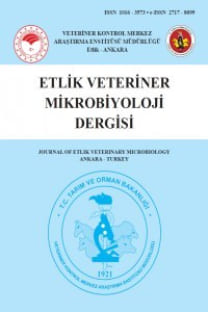Zeranol'ün Kimyasal Özellikleri, Metabolizması ve Toksisitesi
Zeranol, hayvanlarda canlı ağırlık artışı ve yemden yararlanmayı hızlandırmak amacıyla kullanılan nonsteroidal bir anabolik maddedir (23). Bir diğer adı da zearalanol olan zerariol kimyasal kaynaklarda, 3,4,5, 6, 7,8,9, 1 O, 11, 12-decahyro-7, 14, 16-trihydroksi,3-methyl -[35-(3R*, 78*)-IH- 2-benzoksiasidotetradesin-1-one] olarak kaydedilmiş olup, kapalı formülü C18H26O5'dir. Molekül ağırlık 322.40 olan zeranol beyaz, kristalize, kokusuz bir toz olup 180-185°C'da erir. Amerikan Gıda ve Ilaç Idaresi (FDA) tarafından, besi sığırianna derialtı kulak implantasyonu şeklinde bir seterde 36 mg dozda uygulanması ve kesim öncesi 65 günlük bekleme süresi uygun görülmüştür. Bu değerler koyunlar için 12 mg ve 40 gündür (1, 7,20). Zeranol ticari olarak Gibberella Zae (Fusarium graminearum, Fusarim roseum) süspanse kültürlerinden, doğal ürün olarak elde edilen, Zeralenon'dan hazırlanır. Işlemler sırasında zeranol ve taleranol karışımı elde edilir. Zeranol bu karışırndan % 98-99 saflığa kadar ayrılır. Rekristralize edilir bu madde "Ralgro" olarak bilinen ticari formülün esasını oluşturur. Zeranal'ün anabolik etkinliği hiçbir seks ve ırk sınırlaması olmaksızın yeni doğmuş buzağılardan yaşlı sığırlara kadar her grup sığırda yapılan çalışmaların sonucu olarak tespit edilmiştir (1 ).
Anahtar Kelimeler:
Zeranol, Zeronol'ün Kimyasal Özellikleri, Zeranol'ün Metabolizması, Zeranol'ün Toksisitesi, Ahmet AKILLI, 1994, Etlik Veteriner Mikrobiyoloji Dergisi
Chemical properties, metabolism and toxicity of zeranol
___
- BALDWIN, R.S., WILLIAMS, R.D. and TERRY, M.K. : Regulatory Toxicology and Pharmacology. 3:9-25, 1983.
- BARRAUD, B., LUGNIER, A. and DURHEIMER, G. : In vivo Covalent Binding to Rat Liver DNA of Trenbolone as Compared to 1713- Estradiol, Testesterone and Zeranol, in Anabolics in Animal Production. P. 325. Symposium OIE Paris,15-17 February, 1983.
- BARTHOLOMEV, R.M. and RYAN, R.S. : Lack of Mutogenicity of Some Phytoestrogens in the Salmonella/mammalian Microsome Assay. Mutation. Res. 78, 317, 1980.
- BECCI,P.J., VASS, K.A., HESS, F.G., GALLA, M.A., PARENT, R.A., STEVENS, K.R. and TAYLOR, J.M. : Long-Term Carcinogenicity and Toxicity Study of zearalenone in the Rat. J. Apply. Toxicol. 2, 247, 1982.
- BOUTIBONNES, P. and LOQUET, C. : Antibacterial activity DNA- attacking ability and mutagenic ability of the mycotoxin zearalenone. Int. Res- Comun. Syst. Med. Sci 7, 204, 1979.
- CHANG, H.L. and VRIES, J.W. : Short liguid chromatographic method for the determination of zearalenone anda- zearalenol. J. Ass. Off. Analyt. Chem. 67, 741, 1984.7-
- FAO : Residües of same veterinary drugs in ani m als and foods. Food and Nutrition paper, 41, Rom e, 1988.
- FULLER, G.B., BURNETT, B., GRAHM, C. and HOBSON, W. : A primale model for assessing Oestrogenicity the castrate female rhesus monkey. Presented at IX th Congress . of the International Primatological Society, Atlanta, 1982.
- GRIFFIN, T., PAREKH, C., SINGH, A. and COULSTON, F. : No hormonal effect level of zeranal in the cynomolgus monkey. Europeaiı.Toxicology Forum, Geneva, 1983. .
- HIDY, P.H., BALDWIN, R.S., GRESHAM, R.L., KEITH, C.L. and Mc MULLEN, J.R.: Zearalenone and same derivaties: Production and biyological activities. Adv. appl. Microbiol, 22, 59, 1977.
- JANSKI, A.M. : Development of a sensitive method for extraction and assay of zeranal residues in animal tissues and the use of the metod in a multiple implant study in cattle. · In Anabolics in Animal Production. P. 443 Symposium Ol E Paris, 15-17 Februory, 1983.
- JECFA- Joint FAO/WHO Expert Commitlee of Food Additives : Twenty-seventh report: Evaiuation of certain food additives and conıamfnants. Tech. Rep. Ser. Wld. Hlth Org. 696, 33, 1983,
- KATZENELLENBOGEN, B., MORDECAI, D. : Zearalenones characterisation of the esirogene potencies and receptar interactiorıs of a series of fungal ~-resorcylic acid lactones. Endokrinology 105, 33, .1979. ·
- KYREIN." H:J., ·HOFFMANN, B. : In vitro ·and· in vivo effects of hormonal anabolic agents on uterine cytoplasm.ic estrogen recepters in female calves Forschr. Tierphysiol. nerernahr: 6, 91, 1976.
- LINDSAY, D.G. : Zeranel-A nature ldentical oestrojen. Food Chemistry and Toxic. Vol. 23,No. 8, 1985. ·
- MARTIN, B. W. : Management for growth. IMC Conference, Feb. 20-21, Orlando, Florida, 1985.
- MIROCHA, C.F., SCHAUERHAMER, B., CHRISTENSEN; C.W., NIKU-PAAVOLA, M.L. and NUMNUI, M. : Ineidence of zearalenol iri aniqıal feed.App. Envir. Microbiol. 38, 749, 1979.
- PECK, D.N., CHESWORTH, J.M. : Estrojenic activity of zeranal in ewes. Harm. Metab. Res. 9, 1977 ·
- RUDDICK, J.A., SCOTT, P.M and HARWIN, J. : Teratological evaluation of zearalenon administered oral to ibe rat. Bull. Envir, Contam. Toxicol. 15, 1976.
- STEPHANY, R.W. and LOAN, C.A. : A review of methods of analysis for the presence of residues of zeranal or its metabeli ts in slaughter animals, 1985.
- TERRY, M. and MARTIN, B.W. : Update of the safety of zeranol. IMC/pitman-Moore, 1987.
- WILLIAMS, G.M. : DNA damage and repair as for detection of genotoxic agents. Fd. Add. Contam, 1984.
- WHO: Toxicological evaluation of certain veterinary drug residues in food, 1988 ..
- ISSN: 1016-3573
- Yayın Aralığı: Yılda 2 Sayı
- Başlangıç: 1960
- Yayıncı: Veteriner Kontrol Merkez Araştırma Enstitüsü Müdürlüğü
Sayıdaki Diğer Makaleler
İki Değişik İnaktivan İle Hazırlanan Şap Aşılarının İmmunite Sürelerinin Saptanması
Burhan GÜRHAN, Seniha ULUTÜRK, Hasan ÖZTÜRKMEN, Gülhan DAKILIR
Zeranol'ün Kimyasal Özellikleri, Metabolizması ve Toksisitesi
Biyolojik Meteryalde Değişik Metotlarla Striknin Aranması
Prionlar ve Yaptıkları Hastalıklar
Şap Aşılarının Kobaylarda ve Doku Kültüründe Zararsızlık Kontrolü
Samsun Yöresi Sığırlarında Paraziter Epidemiyolojik Çalışmalar
Ahmet CELEP, Mustafa AÇICI, Mustafa ÇETİNDAĞ, İbrahim GÜRBÜZ
